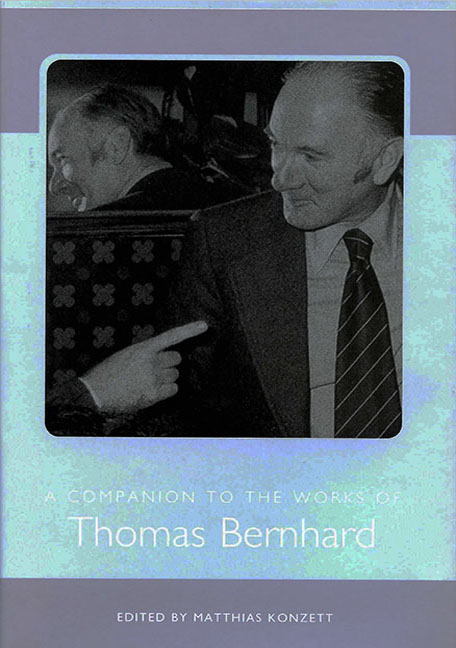Book contents
- Frontmatter
- Contents
- Acknowledgments
- Abbreviations
- Bernhard in the Public
- Bernhard's Poetics
- Bernhard and Drama
- Bernhard's Social Worlds
- Language Speaks. Anglo-Bernhard: Thomas Bernhard in Translation
- Ungleichzeitigkeiten: Class Relationships in Bernhard's Fiction
- Thomas Bernhard's Der Untergeher: Newtonian Realities and Deterministic Chaos
- My Latest Encounter with Bernhard
- Works Cited
- Notes on the Contributors
- Index
Language Speaks. Anglo-Bernhard: Thomas Bernhard in Translation
from Bernhard's Social Worlds
Published online by Cambridge University Press: 28 April 2017
- Frontmatter
- Contents
- Acknowledgments
- Abbreviations
- Bernhard in the Public
- Bernhard's Poetics
- Bernhard and Drama
- Bernhard's Social Worlds
- Language Speaks. Anglo-Bernhard: Thomas Bernhard in Translation
- Ungleichzeitigkeiten: Class Relationships in Bernhard's Fiction
- Thomas Bernhard's Der Untergeher: Newtonian Realities and Deterministic Chaos
- My Latest Encounter with Bernhard
- Works Cited
- Notes on the Contributors
- Index
Summary
The stupidity of entrusting oneself to the German language, my dear Doctor — absurd! And not only the German language, I think, but still the German language above all.
Many of thomas bernhard’s characters, disgruntled Austrians, spent a period of their lives in England. In Austria's postwar culture in which Bernhard came of age, Anglo-culture offered an alternative to the Austrians’ self-image as born guilty, trapped in the provincialism of a tiny Alpine enclave and stuck with a language that had lost all credibility. London, Oxford, Cambridge are codes for rational versus speculative thought, worldliness as opposed to parochialism, a cosmopolitan open-mindedness versus Viennese provincialism, Anglo-composure as opposed to Central-European histrionics. Many of Bernhard's characters are descendants of Austrian gentry and nobility. It is as if the disenfranchised heirs of one collapsed Empire find comfort in the ambience of another, still existing monarchy.
In his self-representations, Bernhard metamorphosed from rough peasant outsider to cosmopolitan country squire. Early photographs show him in the traditional costume of rural Austrians. He appears with Lederhosen, Steirerhut — the Alpine equivalent to the Stetson — heavy knit knee socks and hiking boots while hanging out with the local guys who help remodel his farmhouse. He took pride in his tractor license and the title to his farm, which acknowledged him as “Farmer of Nathal.” Later in life when he spent more time in Vienna, he dressed immaculately with that casual elegance associated with old class rather than new money. Like many upper class Austrians who rejected the native, rural look once favored by the Nazis, he sported the tailor-made, timeless elegance of British clothing.
It seems that the translations of his works follow a similar path. Unlike Peter Handke, who was fortunate enough to have the brilliant Ralph Mannheim translate nearly all of his major prose works, Bernhard had several translators, both in the United States and in England. It was only when David McLintock took on the translations of his later works, starting with his memoir Gathering Evidence to his last work Extinction, that Bernhard finds his voice in the English language and his narrators acquire the flair of the Englishman, if not born then at least bred as such, validating all those years they spent studying in London.
- Type
- Chapter
- Information
- A Companion to the Works of Thomas Bernhard , pp. 169 - 186Publisher: Boydell & BrewerPrint publication year: 2002

